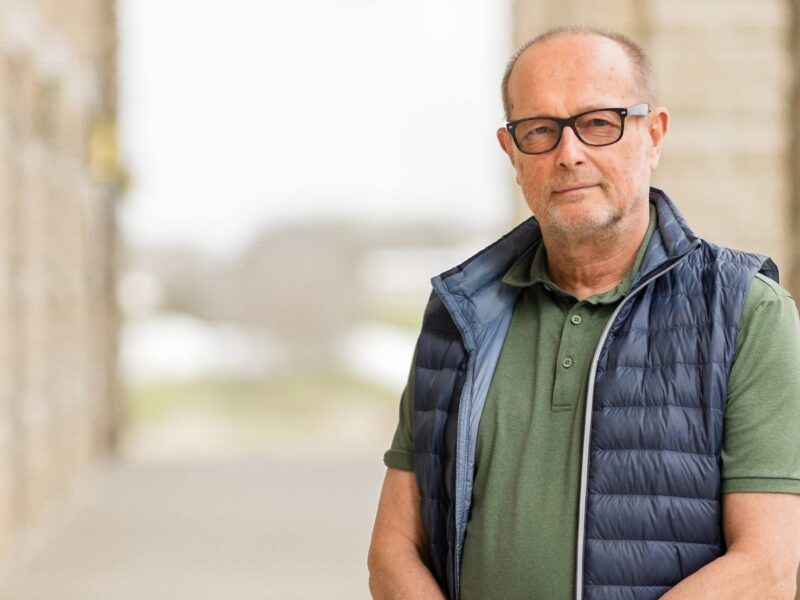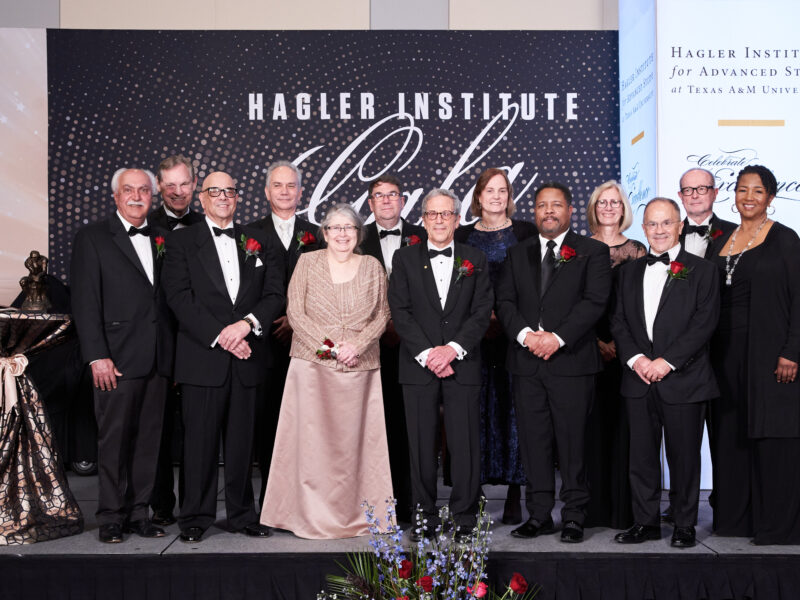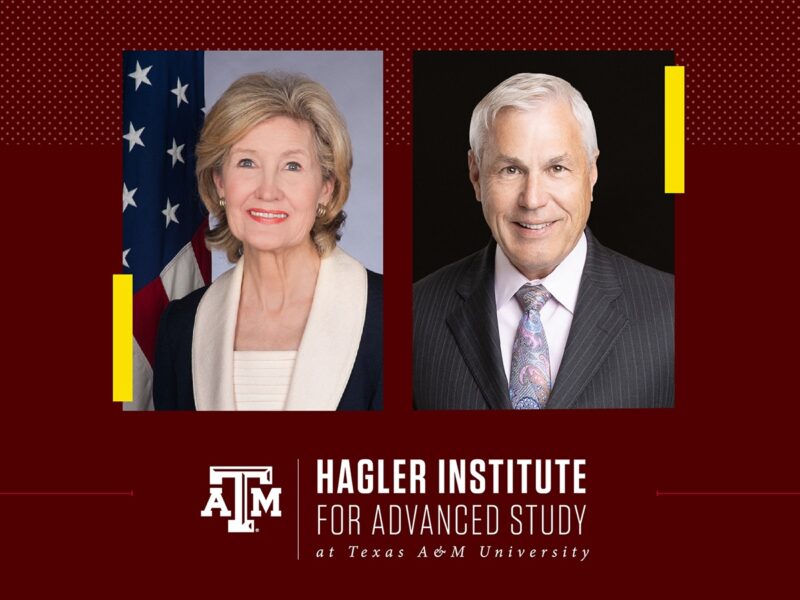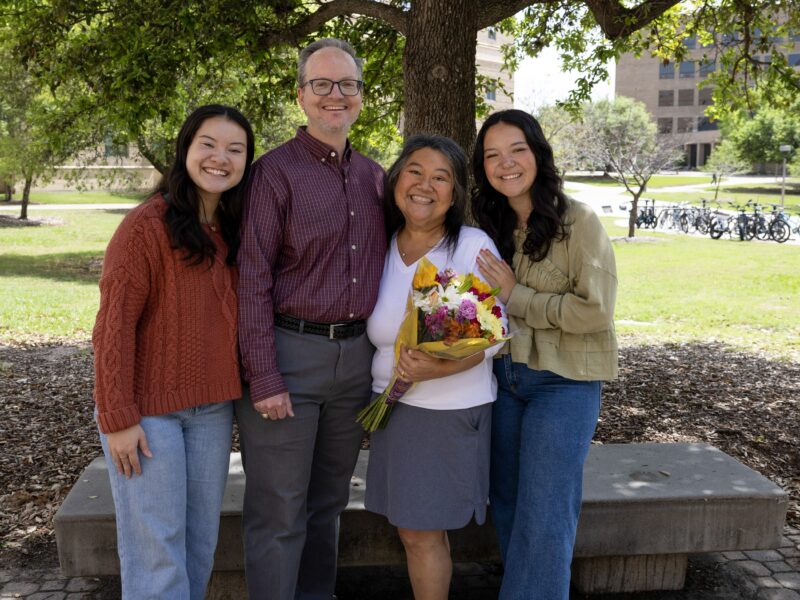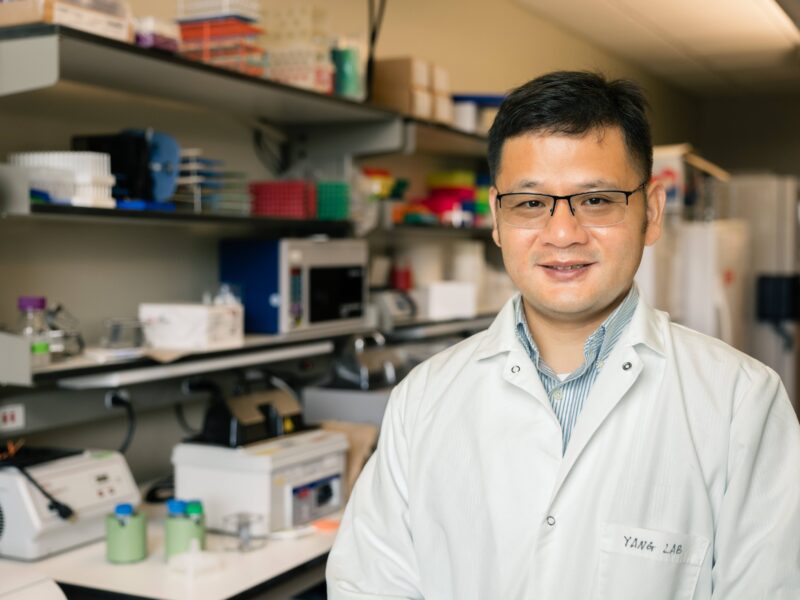Texas A&M Hagler Institute Announces 2019-20 Faculty Fellows, Distinguished Lecturers
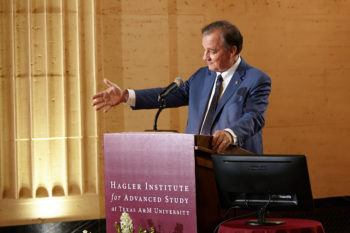
Texas A&M University’s Hagler Institute for Advanced Study has named nine Faculty Fellows for its Class of 2019–20 as well as five Distinguished Lecturers.
Each of these scholars is renowned for significantly advancing scholarship in a wide range of disciplines, including astronomy, engineering, history, law, medicine, nutrition and physics. The newest class of Faculty Fellows includes members of the National Academies of Sciences, Engineering and Medicine, the American Academy of Arts and Sciences, and equivalent academies around the world.
“The Hagler Institute has made an immeasurably positive impact on research and education at Texas A&M over the last seven academic years,” said John Sharp, chancellor of The Texas A&M University System. “In that time, the institute has attracted 70 world-class scholars as Faculty Fellows. Each has collaborated with our faculty and students on trailblazing projects that vigorously advance Texas A&M’s land-grant mission to address the world’s grandest and most urgent challenges.”
This year’s fellows and lecturers will work with faculty and students from one or more departments in the colleges of engineering, science, liberal arts, medicine, veterinary medicine and biomedical sciences, and the schools of law, innovation, public health, and government and public service. The Hagler Institute provides fellowships for graduate students to work with Faculty Fellows as well as funding to support visiting graduate students and post-doctoral researchers affiliated with the Faculty Fellows.
“This particular class brings a level of diversity that is an indispensable component of academic excellence,” said Vice President for Research Mark A. Barteau. “Empirical evidence has revealed the educational benefits of a diverse learning environment contribute to the success and impact of our research enterprise.”
Each year, the Hagler Institute selects its Faculty Fellows from among top scholars who have distinguished themselves through outstanding professional accomplishments or significant recognition. Previous classes have included two Nobel Prize laureates, a Wolf Prize recipient, a recipient of the Hubble Medal in Literature for Lifetime Achievement, a recipient of the National Medal of Science, an awardee of the National Medal of Technology and Innovation, a two-time recipient of the State Prize of Russia and a recipient of both the National Humanities Medal and the Johan Skytte Prize, the most prestigious award in political science
“The Hagler Institute has proven successful at bringing some of the world’s greatest academic talent to Texas A&M,” said John L. Junkins, founding director of the Hagler Institute. “These individuals have been selected not merely to make a headline, but more importantly to make a difference.”
The Hagler Institute will induct the Class of 2019-20 Faculty Fellows at its annual gala in February 2020:
- Luiz Davidovich, professor of physics, Instituto de Física, Universidade Federal do Rio de Janeiro – Davidovich’s major contributions are in the areas of decoherence, dynamics of entanglement, laser theory and quantum metrology. He is a fellow of the Optical Society of America and the American Physical Society. He became a foreign associate of the U.S. National Academy of Sciences in 2006, is a member of the World Academy of Sciences for the Advancement of Science in Developing Countries (TWAS) and is serving as president of the Brazilian Academy of Sciences for 2016-22. Davidovich will collaborate with faculty and students in the Institute for Quantum Science and Engineering and the colleges of science and engineering.
- Sharon M. Donovan, professor and holder, Melissa M. Noel Endowed Chair in Nutrition and Health, Department of Food Science and Human Nutrition, the University of Illinois at Urbana-Champaign – Donovan’s laboratory conducts research in pediatric nutrition, focusing on optimizing intestinal and cognitive development and on development of the gut microbiome. She was elected to the National Academy of Medicine in 2017 and is a member of the American Gastroenterological Society and the American Society for Nutrition. She will collaborate with the colleges of engineering, veterinary medicine and biomedical sciences and agriculture and life sciences.
- Mario Andrés Hamuy, vice president and head of mission, Association of Universities for Research in Astronomy (AURA) Observatory, Chile – Hamuy spearheaded the Calan/Tololo Supernova Survey that established the use of supernovas to measure distances into the far universe, leading to the discovery of the accelerated expansion of the universe. He has served as chairman of the board of Chile National Commission for Scientific and Technological Research (CONICYT), Chile’s equivalent of the National Science Foundation. In 2019, he became an honorary member of the American Astronomical Society and was elected vice president of the Chilean Academy of Sciences. Hamuy will collaborate with faculty and students in the College of Science.
- Peter J. Hotez, dean of the National School of Tropical Medicine and professor in the departments of pediatrics and molecular virology and microbiology, Baylor College of Medicine – Hotez is an internationally recognized physician-scientist in neglected tropical diseases and vaccine development. He was elected a member of the National Academy of Medicine in 2008, a foreign member of the Belgian Royal Academy of Medicine in 2016 and a member of the American Academy of Arts and Sciences in 2018. Hotez will collaborate with faculty and students in the School of Public Health and the College of Veterinary Medicine & Biomedical Sciences.
- Kathleen C. Howell, Hsu Lo Distinguished Professor in the School of Aeronautics and Astronautics, Purdue University – Howell is best known for her contributions to the three-body problem, the interplanetary superhighway and artificial satellite theories. She became a member of the National Academy of Engineering in 2018, a fellow of the American Academy of Arts and Sciences in 2009 and the American Astronautical Society. Howell will collaborate with faculty and students in the College of Engineering.
- Misha Lyubich, professor of mathematics and director of the Institute for Mathematical Sciences, Stony Brook University – Lyubich is best known for his groundbreaking research in analytic low-dimensional dynamics of recursive maps, an important and in-demand area in his discipline. In 2012, he was named to the American Mathematical Society’s inaugural class of fellows and became a member of the American Academy of Arts and Sciences in 2019, the Brazilian Academy of Sciences in 2016 and the European Union Academy of Sciences. Lyubich will collaborate with faculty and students in the College of Science.
- Henry Rousso, directeur de recherche de classe exceptionelle, French National Centre for Scientific Research – Rousso ranks among France’s most significant historians of the modern era, appearing regularly on French and international television as well as in multiple documentaries. Rousso redefined the study of the link between history and memory and historical trauma with his 1994 book, The Vichy Syndrome. He received France’s National Order of Merit in 1995. In 2018, French President Macron selected Rousso to oversee the design of the National Museum on the History of Terror. Rousso will collaborate with faculty and students in the College of Liberal Arts and the Bush School of Government & Public Service.
- Peter Shor, Morrs Professor of Applied Mathematics, Massachusetts Institute of Technology – Shor is known for devising Shor’s Algorithm, a quantum algorithm for factoring exponentially faster than the best currently known algorithm running on a classical computer. He became a member of the National Academy of Sciences in 2002 and a fellow of the American Academy of Arts and Sciences in 2011. Shor will collaborate with faculty and students in the Institute for Quantum Science and Engineering and the colleges of science and agriculture and life sciences.
- Edwin L. “Ned” Thomas, Ernest Dell Butcher Professor of Engineering, Department of Materials Science and Nanoengineering, Rice University –Thomas is known for his development of novel photonic materials and determination of the morphology of block copolymers. He was elected to the National Academy of Engineering and the American Academy of Arts and Sciences in 2009. Thomas became an inaugural fellow of the Materials Society in 2008, a fellow of the American Association for the Advancement of Science in 2003 and a fellow of the American Physical Society in 1986. Thomas will collaborate with faculty and students in the colleges of engineering and science.
In addition, the institute introduced the following Distinguished Lecturers:
- Martha Albertson Fineman, Robert W. Woodruff Professor of Law, School of Law, Emory University – Fineman directs the Feminism and Legal Theory Project, which she founded in 1984. The project brings together scholars from around the globe to engage on issues relating to feminism and the law and has resulted in the publication of 11 books. A recent study by the University of Chicago Law School identified Fineman as the most-cited U.S. family law scholar from 2013-17. She will deliver a series of public lectures on emerging issues in family law and feminist theory, host a workshop of the Feminism and Legal Theory Project and mentor new faculty advancing their scholarly agendas.
- Deirdre N. McCloskey, Distinguished Professor Emerita, Economics, History, English and Communication, College of Liberal Arts, University of Illinois at Chicago – McCloskey is best known as one of the originators of the “rhetoric of inquiry,” how rhetoric affects understanding of scientific scholarship and its relation to public policy. Her historical trilogy books Bourgeois Era are highly acclaimed. She is an honorary fellow of the Institute for Economic Affairs in London and the American Association for the Advancement of Science. McCloskey was a member of the School of Social Science at the Institute for Advanced Study in Princeton, N.J. She will work with faculty and students in seminars and workshops and organize a university symposium.
- Rachel F. Moran, Dean Emerita and Michael J. Connell Distinguished Professor of Law, School of Law, University of California, Los Angeles (UCLA) – Moran writes extensively on equal educational opportunity. She has published numerous articles and book chapters exploring bilingual education, desegregation and affirmative action. Moran is a fellow of the American Bar Foundation, a member of the American Law Institute, and a fellow of UCLA’s Civil Rights Project/Proyecto Derechos Civiles. Moran will deliver a series of public lectures on emerging issues in education policy, civil rights and race and the law. She will collaborate with faculty and students in the School of Law, as well as interact with College Station units and programs.
- Susan M. Wolf, McKnight Presidential Professor of Law, Medicine & Public Policy, Faegre Baker Daniels Professor of Law, and professor of medicine, University of Minnesota – Wolf is known as one of the leading U.S. scholars in health law and policy. She is chair of the Consortium on Law and Values in Health, Environment & the Life Sciences and founding director of the joint degree program in law, science and technology. She became a member of the National Academy of Medicine in 2009 and the American Law Institute in 2014, and a fellow of the American Association for the Advancement of Science in 2008. Wolf will deliver a series of public lectures on emerging issues in health law, regulation, policy and innovation at the schools of innovation and public health and the College of Medicine.
- Huda Zoghbi, professor and holder, Ralph D. Felgin, M.D. Endowed Chair, Departments of Pediatrics, Molecular and Human Genetics, Neurology and Neuroscience, Baylor College of Medicine – Zoghbi discovered the genetic mutations that cause X-linked Rett Syndrome and genetic mutations responsible for several dominantly inherited spinocerebellar ataxias. She was elected a member of the National Academy of Medicine in 2000, the National Academy of Sciences in 2004 and the American Academy of Arts and Sciences in 2018. Zoghbi will organize a Rhett Syndrome conference co-sponsored by the Hagler Institute and will present the Hagler Institute’s Eminent Scholar lecture for spring 2020.
About the Hagler Institute for Advanced Study
The Hagler Institute for Advanced Study was established in December 2010 by The Texas A&M University System Board of Regents to build on the growing academic reputation of Texas A&M and to provide a framework to attract top scholars from throughout the nation and abroad for appointments of up to a year. The selection of Faculty Fellows initiates with faculty nominations of National Academies and Nobel Prize-caliber scholars who align with existing strengths and ambitions of the University.
Media contact: Amanda Scott, 979-458-4989, arscott@tamu.edu.
